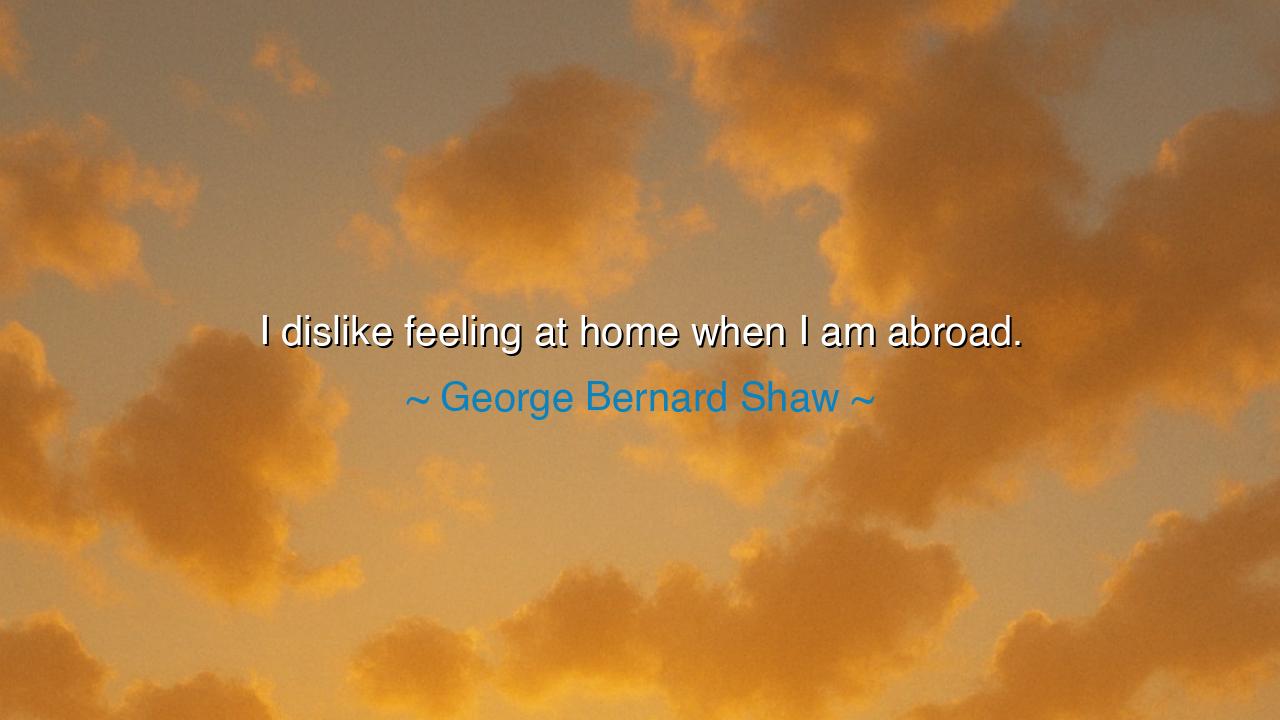
I dislike feeling at home when I am abroad.






The fierce wit and restless spirit of George Bernard Shaw gave birth to this piercing line: “I dislike feeling at home when I am abroad.” At first, it seems paradoxical, even strange—why should a traveler reject the comfort of familiarity in distant lands? Yet beneath his words lies an ancient wisdom: that the purpose of travel is not to carry one’s home with them, but to be unsettled, transformed, and awakened by the strangeness of the world. To feel too comfortable in a foreign land is to miss its gift; to be at ease is to learn nothing.
When Shaw speaks of “disliking feeling at home,” he is rebelling against complacency. For home is where we are known, where customs are familiar, where life flows in predictable rhythm. But abroad—among strange tongues, unknown foods, unfamiliar rites—we are stripped of our certainty. To prefer the comfort of home when away is to shield oneself from change, to build a fortress against growth. Shaw, with the heart of a provocateur, urges us instead to embrace discomfort, for in discomfort lies learning.
The truth of his words is that abroad should feel foreign. To walk in another’s land should shake the soul, forcing it to see that the world is wider, stranger, and richer than the narrow confines of one’s own country. The taste of spice unknown, the sound of language not understood, the weight of customs unfamiliar—these are not inconveniences but revelations. The traveler who feels too much at home may be traveling only in body, not in spirit, shutting their heart against the transformation that the road offers.
History gives us luminous examples of this teaching. Consider Herodotus, called the father of history, who journeyed across Egypt, Persia, and lands beyond Greece. He recorded not with disdain but with awe the customs that baffled him: Egyptians reversing Greek gender roles in work, Persians revering the sun and moon. He did not try to feel at home; he let himself be astonished, and from that astonishment he gave birth to history itself. On the other hand, those who traveled with arrogance—such as certain Roman conquerors—sought only to impose their own ways on others, and thus they learned little, even as they carried armies across the earth.
The origin of Shaw’s insight lies in his restless mind. He was a critic of conformity, a destroyer of illusions. He knew that to grow, one must leave the familiar behind, not just in geography but in thought. By disliking comfort abroad, he was declaring war on the laziness of spirit, which seeks to transform the foreign into the familiar rather than allowing the familiar to be transformed by the foreign. His was the spirit of the true seeker, who would rather be unsettled than lulled into ease.
The lesson for us is clear: when you journey beyond your homeland, do not seek to recreate your own comforts. Do not hide in hotels that mimic your living room, nor dine only on the foods of your country, nor seek only the company of your own people. For if you do, you have not truly traveled—you have merely carried your home in a box, refusing to open it. To truly travel is to be vulnerable, to surrender to strangeness, to allow yourself to feel out of place until, at last, the unfamiliar reshapes your soul.
Practical actions flow from this wisdom. When abroad, eat what the locals eat, even if it unsettles you. Learn their greetings, even if your tongue falters. Sit among them, even when you do not understand their words. Let yourself be a student, not a master. For it is in humility, not control, that the heart learns. And when you return home, you will find yourself changed—not because you brought home with you, but because you let abroad remake you.
Thus, Shaw’s words—“I dislike feeling at home when I am abroad”—become a teaching for all who walk the roads of the earth. To future generations, let this be remembered: the world was not made to flatter your comfort, but to awaken your spirit. To feel at home everywhere is to learn nowhere; to feel the strangeness of the world is to grow into its vastness. And the one who embraces strangeness becomes not merely a traveler, but a student of life itself.






AAdministratorAdministrator
Welcome, honored guests. Please leave a comment, we will respond soon